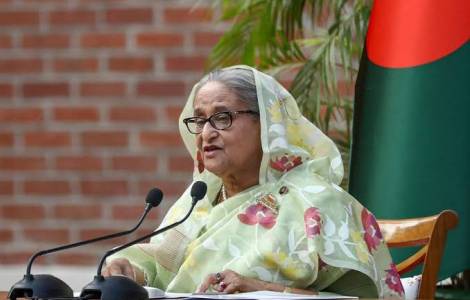
Dhaka (Fides News Agency) - The ouster of Sheikh Hasina Wazed, the former Prime Minister who led Bangladesh for 15 years, is having important geopolitical repercussions in the region. An initial interpretation seems to indicate that India has lost a valuable ally.
The former Prime Minister in fact comes from a family that claims the birthright of the independence of what was then East Pakistan from its western counterpart, to form Bangladesh as we know it in 1971. Sheikh Hasina's father, Sheikh Mujibur Rahman, headed the provisional government of the newborn State, whose institution had been supported by India by way of a war waged on Karachi (this is the third Indo-Pakistani war following those in 1948 and 1965). Sheikh Mujibur Rahman had established close relations with India, but was killed in 1975 in a military coup that saw his family exterminated. Only Sheikh Hasina and her sister Sheikh Rehana, who were visiting the Federal Republic of Germany, escaped death.
Sheikh Hasina temporarily found refuge in India (a country that welcomed her back after her August 5th resignation) and then returned to Bangladesh where she alternated the role of opposition leader to that of Premier.
In her last 15 years as Premier Sheikh Hasina has sought to adopt a policy of good neighbourliness with both India and China, the two next-door giants. The Premier was forced to resign following the revolt which arose when, on June 6, the Bangladeshi Supreme Court decided to reintroduce the quota system in government jobs, which assigns 30% of positions to the descendants of the "freedom fighters" who took part in the 1971 war.
In India, her ouster from power is perceived as weakening New Delhi's influence in the country, to the benefit of Pakistan and China.
Further validating India's concerns is the violence against Hindu minorities that would be instigated by Jamaat-e-Islami, an Islamist party inspired by the Muslim Brotherhood, which had opposed the division of Pakistan and the consequent independence of Bangladesh. The party - through its student movement (Islami Chhatra Shibir, ICS) - participated in the protests regarding quotas and had been banned by Hasina's government on August 1st.
The Bengali branch of Jamaat-e-Islami (there is in fact a Pakistani and an Indian branch) retains important connections with the government of Islamabad. The Indian press in particular is accusing the ISI, the powerful Pakistani secret service, of having channelled its own funds and those received from China to the revolting students (especially those with the ICS) to fuel the protests and topple Sheikh Hasina. All accusations that have yet to be proven, but the Indian government is certainly concerned about the violence against the Bengali Hindu community and fears that its neighbor may become a base for destabilization activities in the eastern states of the Federation.
But New Delhi's suspicions don't end with Pakistan and China. The United States' attitude is also viewed with some mistrust by India; from denouncing the elections in Bangladesh earlier this year (which Hasina won) as "not free or fair", to their official declaration "welcoming the interim government in Dhaka" just hours after Hasina had fled the country. At the same time, the former Prime Minister's entry visa has been revoked by both Great Britain and the United States. If for London, now struggling with internal clashes between white supremacist and Islamist extremists, this measure may have been taken so as not to fuel its domestic fire, for Washington it can be framed in the traditional policy of democratically led administrations to seek agreements with Islamist movements in the Arab world, and globally as well. (L.M.) (Fides News Agency 12/8/2024)